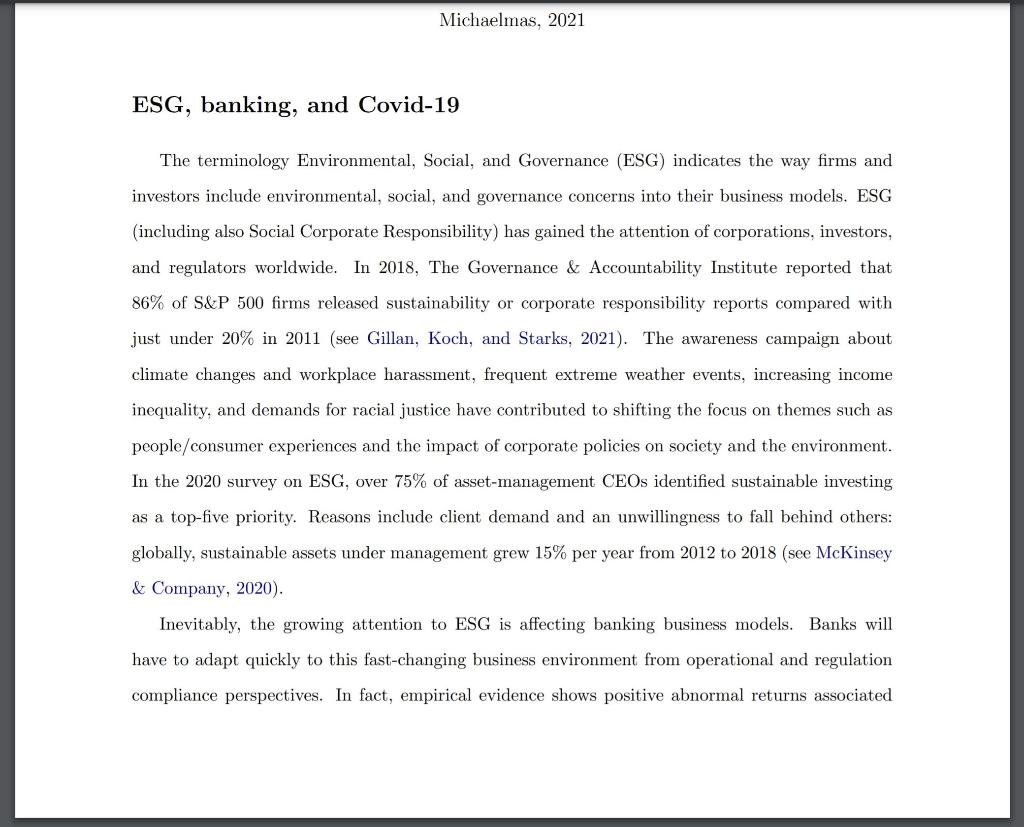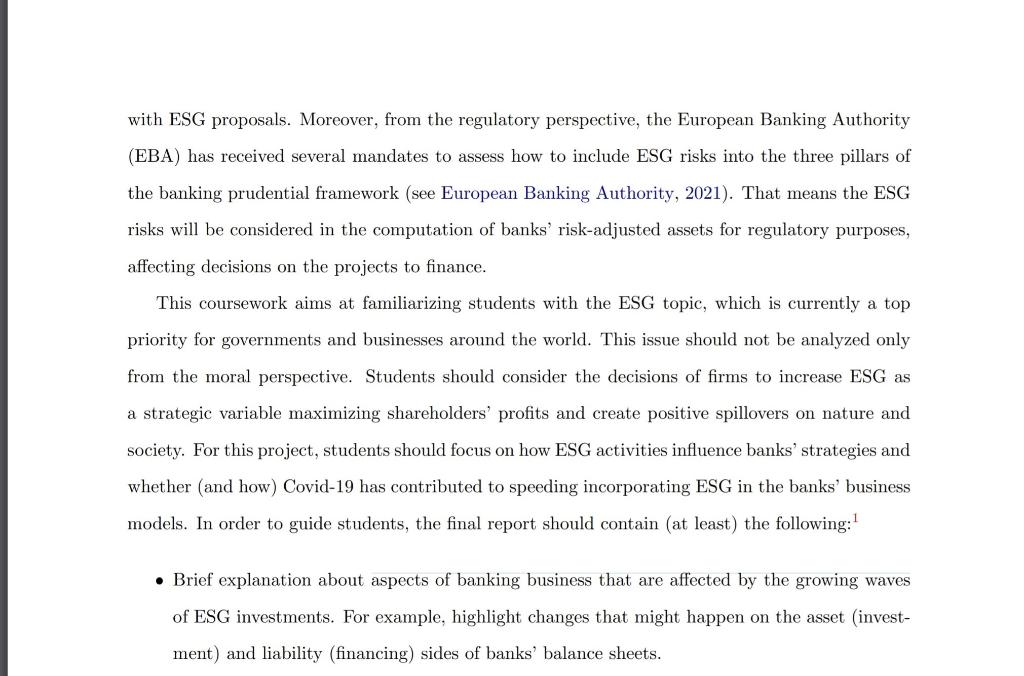

Michaelmas, 2021 ESG, banking, and Covid-19 The terminology Environmental, Social, and Governance (ESG) indicates the way firms and investors include environmental, social, and governance concerns into their business models. ESG (including also Social Corporate Responsibility) has gained the attention of corporations, investors, and regulators worldwide. In 2018, The Governance & Accountability Institute reported that 86% of S&P 500 firms released sustainability or corporate responsibility reports compared with just under 20% in 2011 (see Gillan, Koch, and Starks, 2021). The awareness campaign about climate changes and workplace harassment, frequent extreme weather events, increasing income inequality, and demands for racial justice have contributed to shifting the focus on themes such as people/consumer experiences and the impact of corporate policies on society and the environment. In the 2020 survey on ESG, over 75% of asset-management CEOs identified sustainable investing as a top-five priority. Reasons include client demand and an unwillingness to fall behind others: globally, sustainable assets under management grew 15% per year from 2012 to 2018 (see McKinsey & Company, 2020). Inevitably, the growing attention to ESG is affecting banking business models. Banks will have to adapt quickly to this fast-changing business environment from operational and regulation compliance perspectives. In fact, empirical evidence shows positive abnormal returns associated with ESG proposals. Moreover, from the regulatory perspective, the European Banking Authority (EBA) has received several mandates to assess how to include ESG risks into the three pillars of the banking prudential framework (see European Banking Authority, 2021). That means the ESG risks will be considered in the computation of banks' risk-adjusted assets for regulatory purposes, affecting decisions on the projects to finance. This coursework aims at familiarizing students with the ESG topic, which is currently a top priority for governments and businesses around the world. This issue should not be analyzed only from the moral perspective. Students should consider the decisions of firms to increase ESG as a strategic variable maximizing shareholders' profits and create positive spillovers on nature and society. For this project, students should focus on how ESG activities influence banks' strategies and whether (and how) Covid-19 has contributed to speeding incorporating ESG in the banks' business models. In order to guide students, the final report should contain (at least) the following: Brief explanation about aspects of banking business that are affected by the growing waves of ESG investments. For example, highlight changes that might happen on the asset (invest- ment) and liability (financing) sides of banks' balance sheets. Michaelmas, 2021 ESG, banking, and Covid-19 The terminology Environmental, Social, and Governance (ESG) indicates the way firms and investors include environmental, social, and governance concerns into their business models. ESG (including also Social Corporate Responsibility) has gained the attention of corporations, investors, and regulators worldwide. In 2018, The Governance & Accountability Institute reported that 86% of S&P 500 firms released sustainability or corporate responsibility reports compared with just under 20% in 2011 (see Gillan, Koch, and Starks, 2021). The awareness campaign about climate changes and workplace harassment, frequent extreme weather events, increasing income inequality, and demands for racial justice have contributed to shifting the focus on themes such as people/consumer experiences and the impact of corporate policies on society and the environment. In the 2020 survey on ESG, over 75% of asset-management CEOs identified sustainable investing as a top-five priority. Reasons include client demand and an unwillingness to fall behind others: globally, sustainable assets under management grew 15% per year from 2012 to 2018 (see McKinsey & Company, 2020). Inevitably, the growing attention to ESG is affecting banking business models. Banks will have to adapt quickly to this fast-changing business environment from operational and regulation compliance perspectives. In fact, empirical evidence shows positive abnormal returns associated with ESG proposals. Moreover, from the regulatory perspective, the European Banking Authority (EBA) has received several mandates to assess how to include ESG risks into the three pillars of the banking prudential framework (see European Banking Authority, 2021). That means the ESG risks will be considered in the computation of banks' risk-adjusted assets for regulatory purposes, affecting decisions on the projects to finance. This coursework aims at familiarizing students with the ESG topic, which is currently a top priority for governments and businesses around the world. This issue should not be analyzed only from the moral perspective. Students should consider the decisions of firms to increase ESG as a strategic variable maximizing shareholders' profits and create positive spillovers on nature and society. For this project, students should focus on how ESG activities influence banks' strategies and whether (and how) Covid-19 has contributed to speeding incorporating ESG in the banks' business models. In order to guide students, the final report should contain (at least) the following: Brief explanation about aspects of banking business that are affected by the growing waves of ESG investments. For example, highlight changes that might happen on the asset (invest- ment) and liability (financing) sides of banks' balance sheets








